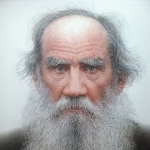Background
Nikita Gilyarov-Platonov was born on May 23, 1824, in Kolomna, Moscow Oblast', Russian Federation. He was the son of priest P. Nikitsky.

Moscow Theological Seminary
Moscow Theological Academy
philosopher publicist publisher
Nikita Gilyarov-Platonov was born on May 23, 1824, in Kolomna, Moscow Oblast', Russian Federation. He was the son of priest P. Nikitsky.
In 1831, Nikita Gilyarov-Platonov entered the Kolomna Theological School, from which he graduated in 1838. In 1844, he graduated with honors from the Moscow Theological Seminary, and in 1848 from the Moscow Theological Academy.
Since 1846, for special achievements in teaching, Nikita Gilyarov-Platonov received a scholarship from Metropolitan Plato and an additional surname Platonov as a badge of honor. He was awarded the degree of master of theology (the theme of the master's essay On the need for the incarnation of the Son of God for the salvation of the human race).
Nikita Gilyarov-Platonov was one of the first in Russia to undertake a thorough analysis of Hegel's phenomenology, revealing the panlogism that underlies his constructions and actually abolishes the category of being (article Hegel's Ontology, 1846). In 1848, he head the chair of hermeneutics and the doctrine of faiths, heresies, and schisms at the Academy. Nikita Gilyarov-Platonov was popular with lectures where the schism was not considered as a delusion, but as a natural product of Russian history, and preached the ideas of toleration and enlightened ecclesiasticism. In 1855, under pressure from Metropolitan Filaret, who saw "dubious thoughts" in Gilyarov-Platonov's lectures, he was forced to submit a petition for resignation and dismissal from the ecclesiastical rank. Since 1856, he was a censor in the Moscow Censorship Committee. After moving to Moscow, he was an employee of the Aksakov publishing house.
Nikita Gilyarov-Platonov reproached Pushkin and Lermontov for their moral indifference and Gogol for the predominance of negation over the assertion of the positive content of Russian life. In the future, appreciating Leo Tolstoy as the greatest artist, Nikita Gilyarov-Platonov implacably treated the spiritual pride of his "Confession", which led to a sharp break in their friendly relations.
In 1858-1859, being a supporter of the liberation of the peasants, Nikita Gilyarov-Platonov compiled a "Set of printed opinions on the peasant question" for the Editorial commission. Dismissed in 1862 after a series of penalties for trying to speed up the passage of articles on the peasant question in conservative publications censored by him, he was appointed manager of the Moscow Synodal Printing House in 1863. In 1868, he retired with the rank of State Councilor. In 1867-1887, he was the publisher, editor, and chief author of the cheap newspaper Modern News, which he created to promote social education. According to his approximate calculations, he placed more than 1,800 articles here.
In October 1887, with the money collected by his friends, Nikita Gilyarov-Platonov went to Saint Petersburg to work on a profitable lease for the Moscow Department. Having been refused, Nikita Gilyarov-Platonov died suddenly.
(Russian edition)
In contrast to the tradition of official theology, Nikita Gilyarov-Platonov distinguished between Christianity and historical Orthodoxy, in which, in his opinion, the idea of Christianity has not yet been fully revealed. He believed in material and social progress but was convinced that the inner nature of man "remains the same from time to time, and the feat of improvement is presented to everyone personally."
His wife was Vera Alekseevna Gilyarova-Platonova (nee Bogdanova), daughter of Archpriest of the Moscow Church. They had 3 children: Nikolay, Alexey, and Nadezhda.

